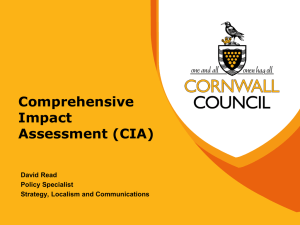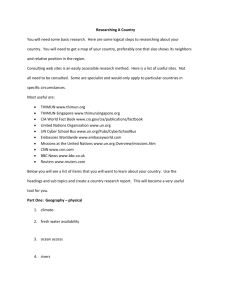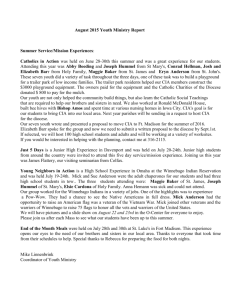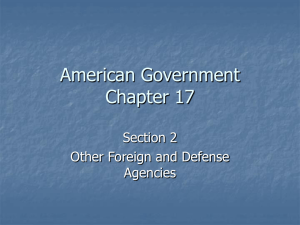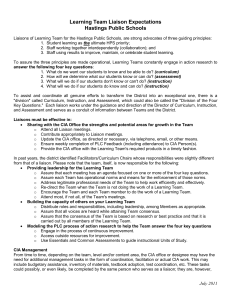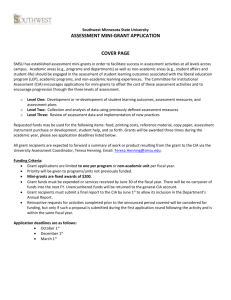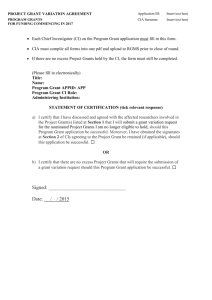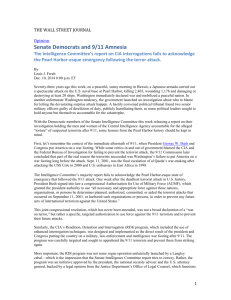The Central Intelligence Agency: 1947 to Today
advertisement
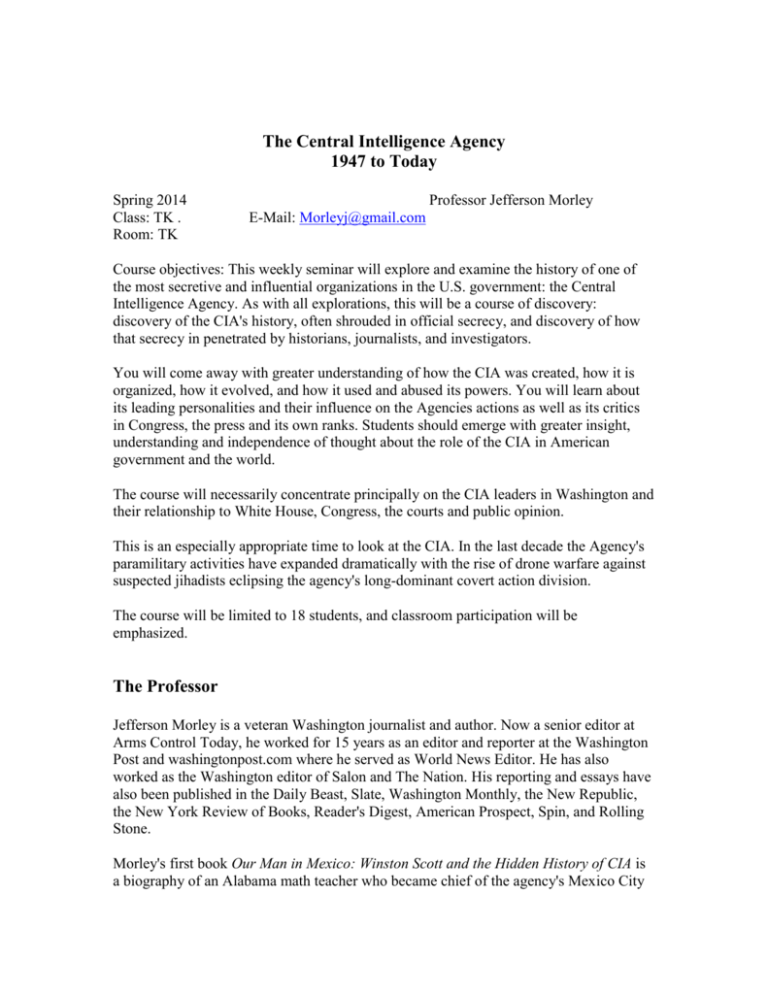
The Central Intelligence Agency 1947 to Today Spring 2014 Class: TK . Room: TK Professor Jefferson Morley E-Mail: Morleyj@gmail.com Course objectives: This weekly seminar will explore and examine the history of one of the most secretive and influential organizations in the U.S. government: the Central Intelligence Agency. As with all explorations, this will be a course of discovery: discovery of the CIA's history, often shrouded in official secrecy, and discovery of how that secrecy in penetrated by historians, journalists, and investigators. You will come away with greater understanding of how the CIA was created, how it is organized, how it evolved, and how it used and abused its powers. You will learn about its leading personalities and their influence on the Agencies actions as well as its critics in Congress, the press and its own ranks. Students should emerge with greater insight, understanding and independence of thought about the role of the CIA in American government and the world. The course will necessarily concentrate principally on the CIA leaders in Washington and their relationship to White House, Congress, the courts and public opinion. This is an especially appropriate time to look at the CIA. In the last decade the Agency's paramilitary activities have expanded dramatically with the rise of drone warfare against suspected jihadists eclipsing the agency's long-dominant covert action division. The course will be limited to 18 students, and classroom participation will be emphasized. The Professor Jefferson Morley is a veteran Washington journalist and author. Now a senior editor at Arms Control Today, he worked for 15 years as an editor and reporter at the Washington Post and washingtonpost.com where he served as World News Editor. He has also worked as the Washington editor of Salon and The Nation. His reporting and essays have also been published in the Daily Beast, Slate, Washington Monthly, the New Republic, the New York Review of Books, Reader's Digest, American Prospect, Spin, and Rolling Stone. Morley's first book Our Man in Mexico: Winston Scott and the Hidden History of CIA is a biography of an Alabama math teacher who became chief of the agency's Mexico City station and one of the most powerful men in that country by dint of charisma, cunning, and espionage. His latest book Snow-Storm in August: Washington City, Francis Scott Key and the Forgotten Race Riot of 1835 tells the story of how the author of the Star Spangled Banner sought to suppress the anti-slavery movement in the nation's capital in the 1830s. Born in New York City and raised in the St. Louis, New York, and Minneapolis, Morley graduated from Yale College in 1980. He lives in Washington. Grading Twenty five percent of your grade will be based upon your participation in classroom discussions. Another 25 percent will be based upon a 3-5 page paper due at the third session; 25 percent will be based upon a 3-5 page paper due at the fourth session; And the final 25 percent will be based upon a 5-10 page research paper due at the 10th session; The final is very important and not just because of the grading aspect. It must be original work and well-documented as to your sources. It puts a premium on organized thinking, solid analysis, a succinct summary of the situation, the reasoning behind your point of view, and on clear and concise writing. Required Reading The required reading for this course is listed under each seminar session. There is also some recommended reading that would be beneficial but is not required. Guest Lectures You will hear from experts in the field. Tom Blanton, director of the non-profit National Security Archive at George Washington University, will talk about how to do documentary research on the CIA. Peter Eisner, a veteran Washington journalist, will talk about reporting on the agency. Tim Weiner, former New York Times reporter, will talk about the CIA's future. The Weekly Course Plan Week 1 —Introduction to the Course and the CIA This will be a survey of the course and its content, explaining the overall approach and themes and describing briefly the content of each session, how they build upon each other, and identifying the broad questions about the CIA that will be addressed, as well as the requirements and expectations for students. We'll also get acquainted with the National Security Archive at George Washington University as a resource. Required Reading: "National Intelligence Organizations" from "The U.S. Intelligence Community," Second Edition, by Jeffrey T. Richelson, pp. 11-29 Week 2---The rise of covert action We'll trace the rise of the agency in the 1950s under Dulles, especially in the agency's success in overthrowing communist-influence government in Iran in 1953 and Guatemala in 1954. We'll look at how the CIA organized those operations, why they succeeded, and how they shaped the future of those countries. Required Reading: "Origins of Covert Action, from "History of the Central Intelligence Agency," by Anne Karalekas, pp. 25-38 "Coup," from "The Very Best Men: Four Who Dared: The Early Years of the CIA," by Evan Thomas, pp. 107-126 "Colossus of the North," From "The Old Boys: The American Elite and the Origins of the CIA," by Burton Hersh, pp. 328-335. Week 3—Failure I: Bay of Pigs We dissect the Agency's first true disaster, the failed invasion of Cuba at the Bay of Pigs in April 1961. We look how the CIA organized the exile force and how it hoped to use that force to overthrow Fidel, why the plan failed, and how the CIA responded to Kennedy's decision-making and the firing of Allen Dulles. Required Reading: "Invasion," from "The Very Best Men: Four Who Dared: The Early Years of the CIA," by Evan Thomas, pp. 237-268. "Washington, The Bay of Pigs," from "Nightwatch: 25 Years of Peculiar Service," by David Atlee Phillips, pp. 85-111. Week 4—Vietnam We'll watch how CIA director Richard Helms managed pressures from the White House produce favorable reporting on the progress of U.S. forces in Vietnam. We'll look at the CIA's program to target and assassinate Vietnamese rebels and why the CIA spied on Americans who opposed the Vietnam war. Required Reading: The CIA and Vietnam from, "The Man Who Kept the Secrets," by Thomas Powers, pp. 218-249. The Phoenix Program: "Saigon: Intelligence at War" from "Blond Ghost, Ted Shackley and CIA's Crusades," pp. 171-195" "Phoenix: a Case Study of Indiscriminate 'Selective' Mass Terror" From "The Washington Connection and the Third World Fascism," by Noam Chomsky and Edward S. Herman, pp. 322-328. (Note: First written assignment is due at the 4th session) Week 5—Scandal We'll study how William Colby responded to Congress as the Agency was confronted for the first time by an adversarial Congress and now-longer compliant Washington press corps Required Reading: "Special Operations Group 'Operation Chaos,'" from "Commission on CIA activities within the United States," pp. 130-150. "The CIA's Mail Intercepts," from "Commission on CIA activities within the United States," pp. 101-129 "The CIA and the Media," by Carl Bernstein. Rolling Stone, Oct 20. 1977. Available at http://www.carlbernstein.com/magazine_cia_and_media.ph Week 6—Recovery We will review how the Agency was curbed by Stansfield Turner and revived by William Casey, whose aggressive use of covert action in Nicaragua lead up to the Iran-Contra scandal in which four CIA officers were indicted for violations of the law. Required Reading: Final Report of the Independent Counsel for Iran-Contra Matters, Lawrence Walsh, Part VI Investigations and Cases: Officers of the Central Intelligence Agency, pp. 199-325 Week 7 —The collapse of communism We'll review the CIA's intelligence collection and analysis about the Soviet Union in its final years of existence. "1985 Reagan and Gorbachev: The Best of Enemies," "From the Shadows," By Robert Gates, pp. 327-345. (Note: Second writing assignment is due at the 7th session) Week 8: Failure II: The 9/11 Attacks We'll look at the CIA's war on al-Qaeda starting in 1998 and its failure to identify the conspiracy organized by Khalid Sheik Muhammad and Osama bin Laden to hijack commercial airliners and fly them into targets in New York and Washington. "The System Was Blinking Red," From The 9/11 Commission Report, pp. 254-277 "The CIA and the 9/11 Conspirators: "The Eleventh Day: The Full Story of 9/11 and Osama Bin Laden," by Anthony Summers and Robbyn Swan, pp. 305 -352 and 375-388 Week 9—Failure III: Iraqi Weapons of Mass Destruction With guest author Peter Eisner, we'll look at the CIA's preparation and vetting of the December 2002 National Intelligence Estimate (NIE) about whether Iraqi dictator Saddam Hussein possessed weapons of mass destruction. We'll look at the performance of Director of Central Intelligence George Tenet. We'll learn about "stove-piping" and "yellow cake" and "Curve Ball" and other CIA terms of art. Required Reading: "Sixteen Words" and "Post-Mortem at the CIA from "The Italian Letter: How the Bush Administration Used a Fake Letter to Build the Case for War in Iraq," by Peter Eisner and Knut Royce pp. 1-45, pp. 203-219. Week 10—The future of the CIA We'll examine David Petraeus and the agency's changing mission after reorganization of the intelligence community and the rise of drone war. Required Reading: Jeremy Scahill, Dirty Wars, Discussion with Tim Weiner, author of "Legacy of Ashes," we'll consider scenarios for the CIA's future. (Note: Final paper is due at this session)
